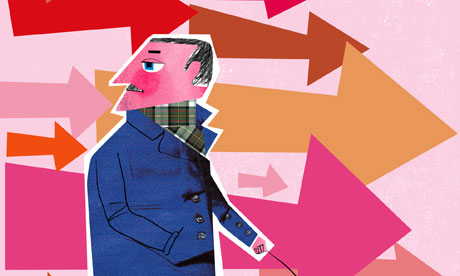
The narrator of Joseph O'Neill's 2008 novel Netherland, a banker who has lived in both London and New York, seems permanently torn between the two – not merely as places to live, but because they embody different approaches to life itself. In London, he observes, people older than 40 considered themselves "over the hill and entitled to an essentially retrospective idea of [life]", as if all the exciting stuff were behind them, whereas in New York "selfhood's hill always seemed to lie ahead, and to promise a glimpse of further, higher peaks".
That makes New York sound more fun, but on closer inspection both are depressing. Would you rather feel your life is over, or that the real you remains out of reach? Maybe O'Neill's globe-hopping banker would have been happier in some less self-regarding world city: Brussels, say, where they have good beer and shellfish, and probably – I'm guessing here – less existential angst.
If we're to believe a recent study from psychologists at Harvard and Virginia universities, though, most of us are Londoners deep down. We labour under what they call the "end-of-history illusion", imagining that the person we are now is the final version, and that we won't change much in future. The researchers asked 19,000 people to complete personality assessments, either recalling how they'd changed in the last decade, or predicting how they'd change in the next. Then they compared the recollections of, say, 40-year-olds with the forecasts of 30-year-olds, and found that people predicted far less change than others remembered. (To make sure that the people looking back weren't misremembering, they compared those results to existing studies of how personalities change.) As one of the researchers told an interviewer, "I have this deep sense that… the core of me [is] not going to change from here on out." Selfhood's hill has been climbed.
It's easy to see how this might land us in trouble. When you assume your current preferences won't alter, you'll make bad decisions: embarking on a career or marriage, say, not with a view to its durability, but solely based on how it makes you feel now. It's the equivalent of those hopeless reader polls to find the best albums of all time, in which this month's novelty pop act edges out the Beatles. Back in the 90s, the American thinker Francis Fukuyama famously declared that western liberal democracies represented the end of history. People mocked him. But in our personal lives, it seems, we make a similar mistake.
Unmentioned in the hype surrounding the Harvard and Virginia research was the uncomfortable possibility to which this points: that the very idea of a fixed and stable self might be, somehow, erroneous. Different versions of that dizzying notion underpin the philosophy of Buddhism, and David Hume, and a thousand two-bit new age gurus. On this view, "we" are endlessly changing patterns of molecules or thought processes; any sense of fixity or coherence is just a mental construct.
The end-of-history phenomenon suggests that we don't mind confronting this from the refuge of hindsight – change in the past is OK – but we recoil from the thought that we'll change no less in future. Yet change is all there is. To be honest, it's all rather exhausting.
oliver.burkeman@theguardian.com
Follow Oliver on Twitter.

